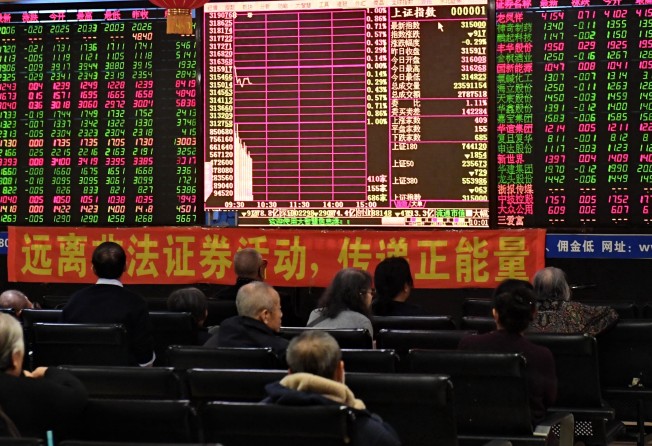China and Hong Kong stocks decline on market turbulence spillover concerns, more US tariffs

Hong Kong stocks dropped the most since mid-June on Wednesday, as traders pulled out of risky assets amid concerns the economic and currency woes affecting developing economies will spill over to the former British colony.
The city’s benchmark Hang Seng Index sank by 2.6 per cent at the close for its biggest decline since June 19. The number of shares that changed hands was 17 per cent lower than the bourse’s 30-day average, according to Bloomberg data.
China’s benchmark Shanghai Composite Index also retreated, falling by 1.7 per cent on expectations the Trump Administration will announce tariffs on another US$200 billion worth of Chinese goods as early as this week.
“The trouble that’s brewing up in emerging economies is significantly cutting investors’ risk appetite, and funds are flowing to US dollar-related asset havens,” said Ken Chen, a strategist at KGI Securities in Shanghai. “The Hong Kong market is not immune to this risk-off sentiment.
“The uncertainty of the trade war has also added to worries that China’s fundamentals will deteriorate,” he added.
A slump in the Indonesian rupiah and runaway inflation in the Philippines are adding to the turmoil in developing countries that started with the collapse of the Turkish lira. Equity benchmarks in these two Asian countries slumped on Wednesday – by 1.6 per cent in Manila and 3.9 per cent in Jakarta – after the rupiah tumbled to about a 20-year low and consumer prices in the Philippines rose at their fastest pace in nine years in August. The US Dollar Index, a gauge of underlying risk averseness, traded near a one-year high.
The Hang Seng Index was down by 729.49 points to 27,243.85 on Wednesday, while the Hang Seng China Enterprises Index, or the H-share gauge, lost 2.3 per cent.
Slowing corporate earnings growth also contributed to the sell-off. The 1,375 Hong Kong-listed companies that had released interim results as of the end of August, posted an average earnings growth of 8.8 per cent, down from a 26 per cent annual increase for 2017, according to Haitong Securities.
All the 50 members on the Hang Seng Index dropped, with technology and financial companies proving to being the biggest drag on the gauge. Tencent Holdings slumped by 4.1 per cent to HK$324.80, accounting for 14 per cent of the benchmark’s decline. AIA Group slid by 3.2 per cent to HK$65.80 and China Construction Bank dropped by 2.6 per cent to HK$6.79.
Great Wall Motors sank by 5 per cent to HK$4.33 after Morgan Stanley lowered its price target for the stock by 42 per cent on lower sales and margin forecasts.
On the mainland, the Shanghai Composite slid by 46.24 points to 2,704.34. The CSI 300 Index of big caps retreated by 2 per cent and the ChiNext measure of growth stocks shed 1.7 per cent.
Consumer and property stocks led the decline. Suofeiya Home Collection, a maker of tailor-made furniture, plunged by 6.4 per cent to 20.96 yuan and carmaker BYD lost 4.5 per cent to 42.50 yuan. Property company China Vanke dropped by 4.2 per cent to 23.41 yuan and Poly Real Estate Group retreated by 4.2 per cent to 11.84 yuan.
China United Network Communications, which owns Hong Kong-traded China Unicom, bucked the trend to rise by 1.1 per cent to 5.56 yuan for a second straight day of gains, on speculation it would merge with bigger rival China Telecom.